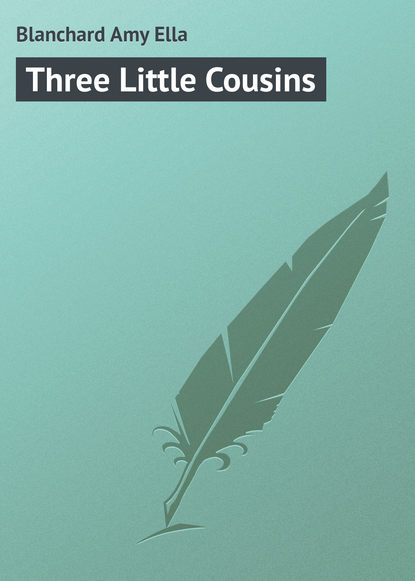По всем вопросам обращайтесь на: info@litportal.ru
(©) 2003-2024.
✖
Three Little Cousins
Настройки чтения
Размер шрифта
Высота строк
Поля
But just as the girls were in despair of ever escaping from their tormentors, another boy came up. "What's up?" he asked.
"Oh, nawthin'," replied one of the boys laughing. "We cal'late to keep furriners away from the P'int, and these here ain't dressed like Amur'cans."
"Who are they?" The boy bent over to peer into Molly's face. She gave a joyful cry. "Oh, Ellis, Ellis, save us from them. They won't let us go home."
The newcomer turned. "Say, you fellows," he said. "You'd ought to be ashamed. These here is friends of mine. If any of you fellows touches one of 'em, I'll pitch into him like sin. Don't you know who they are? They're the little gals up to the Reid cottage, that's been so good to us, nursing the baby and gettin' up that fair and all that."
The boys slunk away. "We didn't know it was them," the largest one said. "Why didn't they say so? We thought it was that crowd of sassy youngsters over by Back Landing; they're always so fresh. One of 'em sneaked off with Dan's boat yesterday and we wanted to pay 'em back."
"I'm awful sorry we scared you," said another boy, coming up. "Was you hurt, sissy, when you fell down?"
"Oh, no, not so very much," replied Grace, ceasing her sobbing.
"We'll see you home safe," said one of the boys. "Come on, fellers. Lem, go get a lantern; we're nearest your house."
Lem ran obediently and in a few minutes returned with the big lantern in his hand. He stalked on ahead, the others trooping after, the dogs at the heels of their masters. All the way they escorted the little girls, Ellis not ceasing to voice his indignation, nor the boys to explain and excuse themselves, and it is needless to say that it was a relief to all concerned when the wandering Arabs were safe within their own dwellings.
In spite of the outcome of their adventure, the girls did not care to repeat it and never again wanted to go beyond the cottages in their own immediate vicinity. Yet, unpleasant as the experience was, it resulted in more than one effort on the part of the gang of boys to make up for their ill behavior. The very next morning after the affair, Polly, who was the first down-stairs, saw a tall boy coming toward the cottage and went out on the porch to meet him.
"You one of the little gals that was down the road last night?" he asked as he came up. "One of them that was dressed up?"
Polly nodded. "Yes, I was there."
"Us boys didn't know you lived here. We wouldn't have hurt a hair of your head if we had knowed who you was." Then he added somewhat shamefacedly, "I fetched ye a salmon. Maybe ye ain't never see a salmon jest out of the water. They're pretty-colored, ain't they?" And he held up to view the glistening pink fish.
"Oh, how beautiful it is. It seems too pretty to catch, doesn't it?" said Polly bending over to examine the fish the boy laid on the grass.
He stared at her, not quite comprehending how any one could think any fish too pretty to be caught. "They're awful good eatin'," he went on to say, "but they don't often come in here."
"How did you happen to get this one?" asked Polly.
"It was in my father's pound this morning, and I begged him for it. Shall I take it into the kitchen for you?" he added hastily.
"Oh, do you mean to give it to us? How very good you are," said Polly appreciatively.
The boy gave a short laugh. "I wasn't very good last night, was I?" he said, and Polly understood that this was a peace-offering.
That afternoon two younger lads were seen hanging around the house bearing a mysterious something done up in a newspaper. "What in conscience do them boys want?" said Luella, looking out of the kitchen window. "It's Billy Laws and Horeb Potter. What are they peekin' around here for I want to know." One of the boys now advanced toward the house, but at the appearance of Miss Ada on the porch, he took to his heels, and lurked in the distance where his companion was uneasily waiting.
Luella went out to Miss Ada. "Them boys has got some errant here," she said, "but they won't come in whilst they see you on the piazza." Miss Ada reëntered the house. The three little girls peeped from the windows, looking out from behind the blinds. In a few minutes the boys came stealthily forth, tiptoed toward the house, halted fearfully, took a few steps back, came on more quickly. He who bore the newspaper package was suddenly pushed violently forward by the other and came on with a trot, bolted into the kitchen, laid the package on the table before Luella and exclaimed hastily: "It's for the little gals!" then he took to his heels, not stopping till he was clear out of sight.
Luella came laughing into the living-room. "Here's another present," she announced. "You open it, Miss Ada."
"What can it be?" exclaimed the children, gathering around their aunt who untied the string of the damp parcel, unwrapped it and disclosed to view a huge lobster, fiery red, and still warm from recent boiling.
"Isn't he a monster?" exclaimed Miss Ada. "I don't believe I ever saw a larger. We'll have him for supper, Luella. I hope you took half the salmon to Mrs. Wharton, for we couldn't eat that and this, too. Children, you will have to invite Grace over to have her share. I suppose some of it is due to her anyhow."
"She ought to have it all," said Polly, "for she was the only one who was hurt."
"I'm afraid she'd suffer more still if she attempted to devour this entire lobster," laughed Miss Ada. "We'd better spare her little turn, Polly, and help her eat this."
It was after such of the lobster as they could eat had been disposed of, and the children with no desire for long wanderings, were safely gathered around the fire, that a tap was heard at the door. Uncle Dick arose to open it and received into his hands a large cold jar, while a small lad piped out: "Jerry sent this to the little gals. They'll keep." And then the figure vanished into the darkness.
"I don't know who Jerry is, nor what 'this' is," said Uncle Dick, bearing in the glass jar and setting it on the table. "It's for the 'little gals' I was told. Great Caesar! It's clams, carefully shelled. See here, Ada, we won't have to buy any more provender this season at this rate. When we get short of provisions we can send out our Arabs on the road, for behold the result of their evening's migrations."
Every one laughed at this latest gift, and it was set away for the next day's use. But the end was not yet. On the door sill the next morning was discovered a splint basket. To the handle was tied a scrap of paper on which was awkwardly written: "To the little gals." Molly was the finder of this. "Hurry down all of you!" she called to the others. "There is a present."
"Another one?" said Polly over the baluster. "What is it?"
"I haven't looked," was the reply.
The other children, joined by Miss Ada, came down as soon as possible, their curiosity excited. Molly lifted the wet seaweed covering the contents of the basket and they saw a pile of shining little mackerel.
"Tinkers!" cried Miss Ada. "What a nice lot of them! Oh, and there are some butter-fish, too. They are all cleaned beautifully, and we must have some for breakfast; it will take only a few minutes to cook them. Yon children can run over to Grace with her share."
This the little girls were glad to do, but returned with their platter full explaining that smaller lot had been left at the Whartons'.
But two more conscience offerings were received after this. Four thick braids of sweet grass were found hanging on the door-knob, and, during the day a man delivered a mysterious box slatted across one end. This was found to contain a beautiful kitten of the variety called "Coon." The children were wild over this last gift, the only drawback to their delight being the difficulty of deciding which one should take it home. Their Aunt Ada came to the rescue by telling them not to bother about it till the time came and then to let circumstances settle it. Her own little cat, Cosey, was not inclined to favor the intruder at first, but in a few days she began to mother it and they soon became good friends.
"Are you glad that the boys scared us that night?" asked Polly one day not long after the "day of gifts" as the children called it.
Molly weighed the subject. "When I think of the dear kitten and the salmon and the tinkers."
"And the lobster."
"Yes, and the sweet grass, then I am, but when I think of how dreadfully frightened we were, I'm not."
"I don't intend to remember the scare," said Polly philosophically.
"Neither do I," added Mary. "I'd be an Arab again for the sake of finding out how really good-hearted those boys are," which showed that Mary had a good heart, too.
CHAPTER XI
The Roseberry Family
The green grass of June had turned to russet; the bay berry bushes began to look dingy, and the waxy cranberries in the bog were turning to a delicate pink. It had been a dry season and the children could safely traverse the bog from end to end without danger of getting their feet wet. Ellis was their pilot to this fascinating spot, and the day of their introduction to it was one long to be remembered.
It was one morning when Ellis came around to the back door to deliver clams that they first heard of the bog. He added to the weekly order a little bag of pinky-white cranberries. "I thought maybe you'd like 'em," he said. "Miss Alice Harvey says they're much better when they're not quite ripe. Ora tried some and they were fine, but they took a lot of sugar."
"Thank you for remembering us," said Miss Ada as she received the offering. "How much, Ellis?"
"Nawthin'. They're easy to pick and there's plenty of 'em," he made reply.
Miss Ada accepted the gift in the spirit in which it was intended. "I'm sure we shall enjoy them," she declared. "Where is the bog, Ellis? Is it very wet there?"
"'Tain't wet at all this year. This has been such a dry season. It's down back of Cap'n Orrin's barn."
"Oh, is that the place?" Molly was peeping over her aunt's shoulder. "I've always longed to go there but I was afraid it was all sloppy and marshy; some one said it was."











